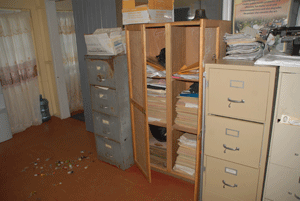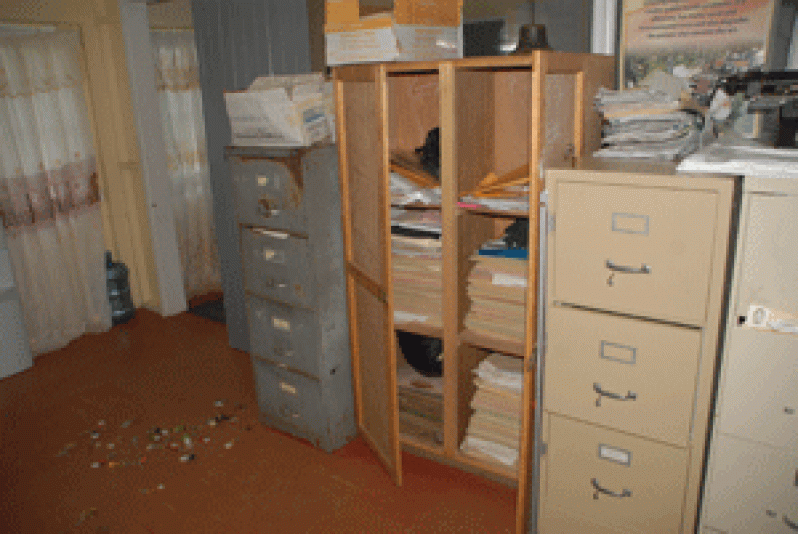THE combined Parliamentary Opposition, last Thursday evening, was thwarted in an attempt to re-arrange the Order Paper in the House and bring forward the readings of four local government bills.
 The move was met with silence from Members of Parliament (MPs) on the Government side which led to the bills, eventually, being deemed “dropped orders”.
The move was met with silence from Members of Parliament (MPs) on the Government side which led to the bills, eventually, being deemed “dropped orders”.
The Fiscal Transfers Bill, the Municipal and District Councils (Amendment) Bill, the Local Government (Amendment) Bill and the Local Government Commission Bill were all scheduled for second readings at the last sitting of the National Assembly.
Their passage was expected to pave the way for the holding of Local Government Elections, which were constitutionally due in 1997 but not held since 1994.
The bills were on the agenda to be read after the Hydro-Electric Power (Amendment) Bill and the Debt Ceiling Motion but A Partnership for National Unity (APNU), MP Basil Williams rose on a point of order and requested that the four related bills be re-ordered to appear as the first items under Government Business.
Speaker Raphael Trotman advised that Williams, had, on the previous day given him notice of his intention. The former cited Standing Order 112 which states that any one or more of the standing orders may, after notice or with the leave of the Speaker, be suspended on a motion moved by a member at any sitting.
Meanwhile, Government Chief Whip Gail Teixeira, on behalf of the Government opposed the request for the suspension of the standing orders and quoted Standing Order 24:3 which states that Government Business shall consist of motions to be proposed and bills sponsored by ministers, set down in the way the Government thinks fit.
She said the suspension proposal was attempting to take away the right of the Government to have matters on the agenda under Government Business put how they must occur.
“This is unacceptable that the member would come and bring a suspension order to distort, disrupt and violate the Government’s right to bring its business in its order. This is a very, very serious issue, it’s very serious because it is unheard of in any parliament that the Government’s business, without its acquiescence, is being eroded in this manner,” she maintained.
The Chief Whip contended that at issue is not the Local Government Bills but, rather, the matter that the Government’s business in the order it wishes to bring to the National Assembly is being undermined and called it a “dangerous move.”
However, Mr. Trotman held that Standing Order 112 speaks for itself and that, as much as it may be “unpalatable, distasteful and unprecedented” any one or more of the Standing Orders may, after notice or with leave of the Speaker, be suspended on a motion moved by any member at a sitting.
“I accept that Government would not be happy, but Standing Orders do provide for the suspension of any of the Standing Orders and so I rule that the request or the motion of Mr. Williams shall stand,” the Speaker said.
The Government MPs called for a division and it resulted in 32 members voting in favour of Williams’ motion and 31 against.
THE DEBATE
Consequently, the Speaker said the Minister of Local Government and Regional Development, Mr. Ganga Persaud should start the debate on the four bills.
Trotman noted that, when the suite of legislation came up to be debated last year, they were referred to a Special Select Committee, which has since submitted its report to the Assembly and the measures were returned to the Local Government Minister.
Persaud, however, chose to give the Assembly the “silent treatment” on all four bills, to protest Government’s disagreement with the Williams motion to re-arrange the Order Paper.
Trotman then asked Prime Minister Samuel Hinds to advise on Government’s position in relation to the bills but the latter also remained silent.
He said, as Speaker of the House, he could not compel the subject minister to commence the debate, neither was there any matter on which he must rule.
“I have invited the subject minister and the Prime Minster to indicate, to the chair, Government’s intention. I have received silence as a response. It is very difficult for me to interpret that formally,” the Speaker observed.
He ordered a short recess and invited the Government and Opposition Chief Whips, along with senior members of the parties to his chambers to consider the way forward.
After the break, though, the Clerk of the National Assembly, Mr. Sherlock Isaacs was invited to name the bills and the Speaker advised that, if the silence is maintained by the minister, the sitting will proceed.
Once again, there was no response from the Local Government Minister and Trotman explained that when this happens the bills become known as “dropped orders”.
He said, further, that if no date is given or motion moved for a bill to be debated, it comes off the Order Paper until one is indicated.
“There being no answer or response of indication, verbal or otherwise, from the minister, this suite of bills falls into the category of ‘dropped orders’ and will not be proceeded with today,” Trotman declared.




.png)









